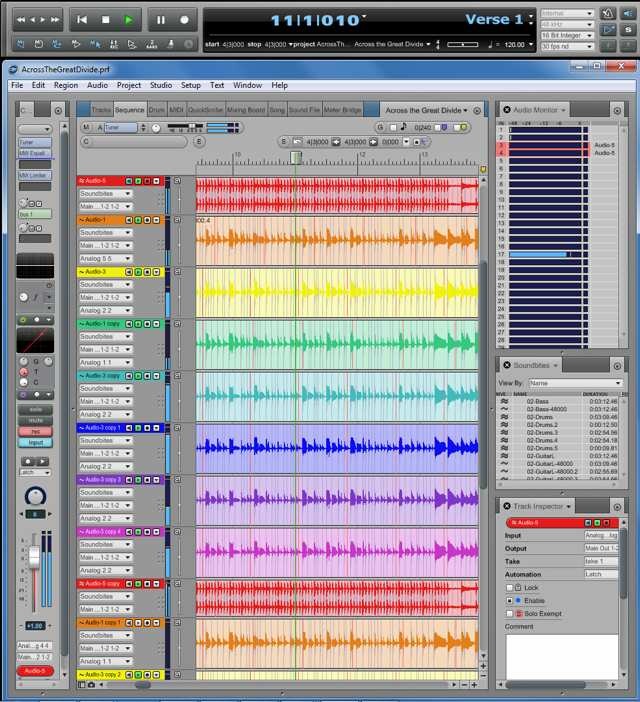MOTU has released Digital Performer 8 for Mac & Windows, the latest version of its audio + MIDI DAW.
Here’s what’s new in DP8:
- 64-bit support – Digital Performer’s 64-bit support ensures that you can take full advantage of all the memory space in your computer for optimum performance from your MOTU desktop studio.
- Windows 7 support – Version 8 brings Digital Performer’s award-winning design and features to Windows 7 and beyond. Operation is almost identical to the Mac version, making it easy to work on either platform.
- 17 new effects plug-ins – Digital Performer’s 17 new plug-ins add to an array of over 80 included effects. You get everything from modeled analog EQ to realistic convolution reverb.
- 15 new themes – Digital Performer gives you dozens of user interface themes that completely transform the look of the app.
- Punch Guard confidence recording – Digital Performer’s new Punch Guard features always captures extra time before and after punch points, so you can simply uncover any additional material with a simple edge edit.
- 100% Cocoa UI for Mac OS X – Many of the third-party plug-ins you’ll use everyday with Digital Performer are in the process of being converted from Carbon to Mac OS X’s ultra-modern Cocoa UI platform, and Digital Performer is 100% ready to host them. Cocoa is the future, and Digital Performer is there.
- New video playback engine – Enjoy full-screen viewing of 720 or 1080 HD video clips on a primary or secondary computer monitor, or on a conventional HDMI or SDI video monitor connected to a MOTU video interface like the HD Express or HDX-SDI.
- In-line control panel – You can now embed the control panel in the consolidated window to conserve screen space. Customize what appears, including the shortcut buttons and editor tools. Pop it in or out at any time.
- Plug-in management – Version 8’s new plug-in chooser lets you organize and quickly find the effect or preset you are looking for. You can also organize all your plug-ins, factory and third-party alike, just the way you prefer, regardless of format.
- Rewire and VST plug-in support – With support for VST plug-ins and Rewire on both Mac and Windows, you can easily move DP projects from one platform to the other seamlessly, with no additional steps required. Just open the project and go.
DP8 is priced at $495. The DP8 upgrade is $195.00. See the MOTU site for details.
via Jon Stubbs


With DP7, MOTU stepped into Logic’s territory with big boots. The only place Logic beats it is still true with DP8: the included instruments. If you want to be automatically levitated, go look at the latest Mach5. Talk about a desert island instrument! The content is truly massive and the thing will convert even ancient sampler formats. Its the most wide-open soft-instrument I have seen. Its not cheap, but you get far more than what you pay for. I have a DP-loving pal who swears by it, too. If I was not already happily invested in Logic, I’d be on DP like a shot. I encourage people to read MOTU’s specs. Its almost like something from “Star Trek.” I’ve also used Symphonic Instrument for about 3 years and its rock-solid. Two thumbs-up for MOTU, especially where customer service is concerned.
>The only place Logic beats it is still true with DP8: the included instruments
Don’t forget the $300 less that Logic costs.
I’m a long-time DP user, and was very excited about the new dynamic EQ which is 5 bands (three swept and hi/lo shelves). I was pleasantly surprised to see they also have a new Spatial Maximizer which is a dual dynamic EQ for MID and SIDE– (if you don’t know about mid-side, it’s worth researching). Each band has separate dynamics controls including separate look-ahead. That’s huge.
This is a professional rig. As for bundled instruments, what they include is ok, but if your bread & butter is with VI’s you’ll need some 3rd party ones.
The comparison of DP and Logic is definitely worthwhile if someone is making a decision about buying DAW software. It is sensible to carefully consider your potential work flow, and needs, then research the software to see if it has the depth and features you need at a price you can afford.
DP is a VERY powerful and well-designed program, I use it daily and it is brilliant. It doesn’t interfere with my workflow or restrict me in any way.
Both DP and Logic require that use 3rd party VI’s, some effects, and perhaps notation.
For the nitty-gritty of MIDI sequencing, composition, audio production, and audio for video; DP is fantastic and geared toward professional work. Tons of powerful features are very well engineered for working in the day-to-day.
Logic has a lot of great things going for it too. And it is cheaper. But for me, it’s no contest. I’d much rather spend the extra dough and get DP8 than Logic any day.